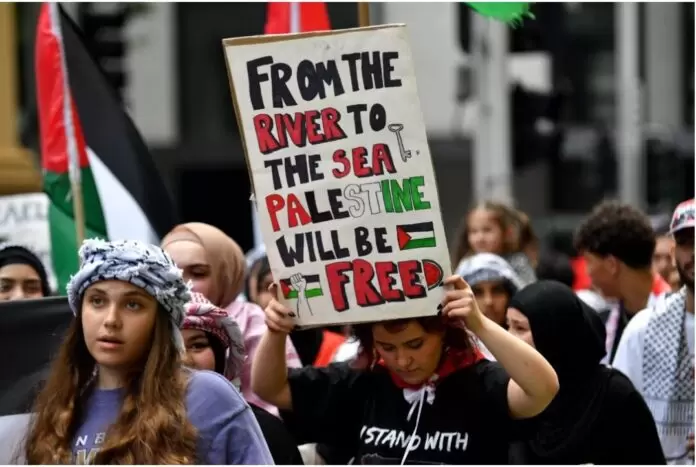The last week has seen a rare bipartisan approach to condemn a phrase that denotes hatred and incites violence.
On May 15—Nakba Day, which commemorates the start of the war between Israel and its Arab neighbours in 1948—Western Australian Senator Fatima Payman described Israel’s military operation in Gaza as a “genocide.”
She used the phrase, “From the river to the sea,” associated with the Palestinians’ desire to destroy Israeli statehood.
The senator’s outburst may have relied, impliedly, on a report released by Amnesty International on Feb. 1, 2022.
It concludes that Israel’s actions amount to “apartheid.”
The politically charged phrase used by the senator may be an expression of a strongly held belief and candour.
The Way Forward Means Letting Go of the Past
This issue concerned me because I just returned from a weeklong teaching assignment at the University of Sydney.
It was challenging because, each day, I had to navigate my way through a pro-Palestine tent city. It was an unkempt and motley collection of tents, tables, chairs, flags, banners, and cooking utensils that defaced the great Quadrangle, the original building of the University constructed in 1855 to 1862.
The beginning of May is also the time when graduations are held. Every day, I witnessed a procession of proud fathers and mothers, holding a luxurious bouquet of flowers with their graduating scions laboriously making their way through the tent city to the Great Hall of the Quadrangle.
I witnessed a boisterous procession of protesters, who used loudspeakers to denounce the military operation of Israel in Gaza.
Some protestors attempted to address students in classes, but university authorities had advised lecturers that they could reject requests from the protestors to address students.
Of course, it would be interesting to ascertain how many lecturers had the courage to refuse their entreaties.
The protestors accused the Jewish state of “genocide” as far back as the wars of 1947-1949 and 1967, and sought to redress it with their own brand of hate speech and vitriol.
Even if the report is accurate in its description and assessment of Jewish policies and atrocities—always a contested issue—it raises the question as to how backward-looking protests could ever become the basis for a promising way forward in the future.
Are these protests the expression of ideas, which should be tolerated on university campuses, even if most students were to disagree with them?
History Is a Complex Web
It could be speculated that, likely, most student protestors do not possess a good knowledge of history.
History teaches us that the existence of displacement of peoples and dispossession of their lands have occurred throughout history.
As Australian rabbi and academic Shimon Cowen correctly points out, history is replete with stories about the dispossession of land.
“It is a nearly, if not wholly, universal phenomenon that states all over the world have generally displaced earlier nations or groupings and occupied their territories. After the event of conquest and the establishment of a new State on the conquered territory, with the practical submission and acceptance of its subjects, the state becomes its owner.”
Although Mr. Cowen’s comments were written in the context of the claimed “invasion” of Australia by British settlers in 1788, it is relevant to the discussion of the Gaza and Israel war.
Of course, it is not a justification of the periodic occurrence of atrocities, but they serve as an invitation to fashion ways in which it is possible to create a better world for all.
In other words, his comments are invitations to develop forward-looking methods to contribute to a sustainable and peaceful future.
Nevertheless, Ms. Payman’s and the protestors’ statements and actions are an expression of free speech, which should be protected because it enables society to enter a discussion on the appropriateness and truth of these statements.
If their right to freedom of expression were curtailed, their views would be relegated to the underground where they would fester and infect.
Of course, it is sensible to ask whether a university campus, or even the parliament, are appropriate venues in which to make these statements.
Moreover, people might consider whether it is wise to use a politically charged phrase, such as “from the river to the sea” because it is an expression of anti-semitism, which has no place in a true democracy.







